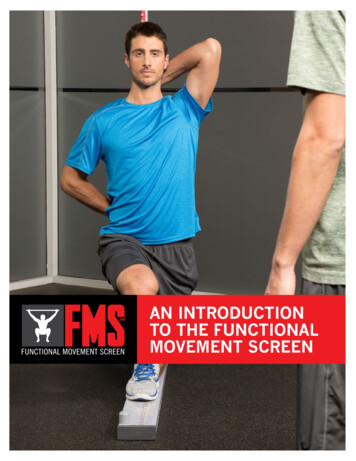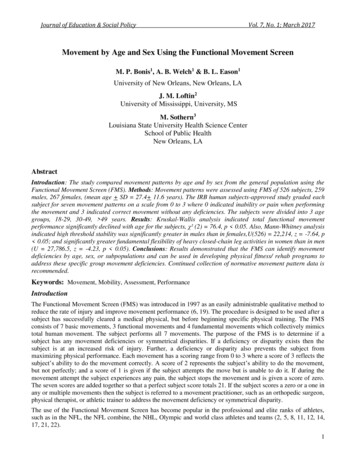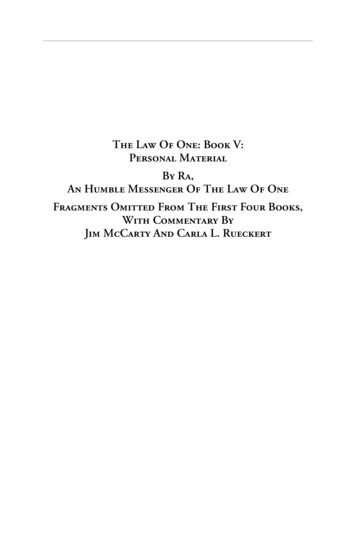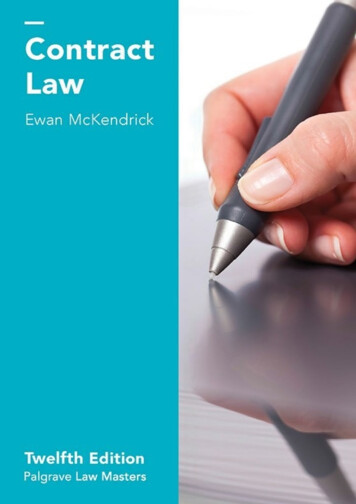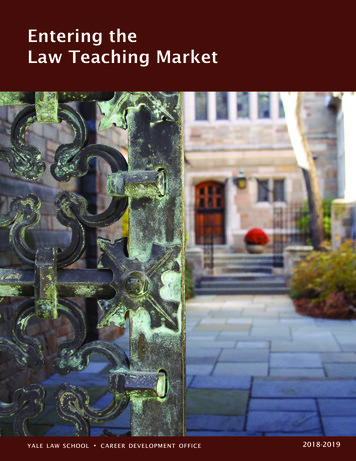
Transcription
Stein Scholars SymposiumLaw & The #MeToo MovementFriday, April 5, 201910 a.m.–5 p.m.Costantino Room(Second Floor)CLE COURSE MATERIALSThis event is presented in conjunction with 100 Years of Women,Fordham Law Women, National Lawyers Guild, Advocates for Sexual Healthand Rights, and American Constitution Society for Law and Policy.
Table of Contents1. Speaker Biographies (view in document)2. CLE MaterialsPanel 1: Intersectionality & The #MeToo MovementBurke, Tarana. #MeToo was started for black and brownwomen and girls. They’re still being ignored.(View in document)Scott, Eugene. The marginalized voices of the #MeToomovement. (View in document)Onwuachi-Willig, Angela. What About #UsToo?: TheInvisibility of Race in the #MeToo Movement.(View in document)Panel 2: Access to Justice & The #MeToo MovementAccess to Justice Combined Materials. (View in document)Panel 3: The #MeToo Movement in the Digital AgeBeckett, Jennifer; Whitty, Monica. #MeToo must alsotackle online abuse. (View in document)Powell, Catherine. How #MeToo Has Spread Like WildfireAround the World. (View in document)Donegan, Moira. I Started the Media Men List. My name isMoira Donegan. (View in document)Citron, Danielle Keats. Sexual Privacy.(View in document)Brin, Dinah. Social Media Is a Major Consideration inWave of Sexual Harassment Allegations.(View in document)Panel 4: The Future of The #MeToo Movement: Whatare the Next Steps?What are the Next Steps? Combined Materials.(View in document)
Law & The #MeToo Movement Speaker BiosMichelle AndersonMichelle J. Anderson is the 10th president of Brooklyn College. She is a leading scholar on the law of rapeand sexual assault, an adviser to the American Law Institute’s project to reform the Model Penal Code onsexual offenses, and a consultant to its project on campus sexual misconduct.Anderson is a graduate of the University of California, Santa Cruz and Yale Law School, where she wasNotes Editor of the Yale Law Journal. Following law school, she clerked on the United States Court ofAppeals for the Ninth Circuit for Judge William A. Norris. Her scholarly research on rape and sexualassault has been published in the Yale Law Journal, Boston University Law Review, George WashingtonLaw Review, Rutgers Law Review, and Southern California Law Review, among others. Prior tobecoming President of Brooklyn College, Anderson was the Dean at CUNY School of Law for a decade.She previously served as a Professor of Law at Villanova University School of Law, as well as a VisitingProfessor at Yale Law School, the University of Pittsburgh School of Law, and Georgetown UniversityLaw Center.Alex BaptisteAlex Baptiste is policy counsel for workplace programs at the National Partnership for Women &Families, where she focuses on state and local paid sick days campaigns, sexual harassment andpregnancy discrimination and accommodations.Prior to her work at the National Partnership, Alex practiced real estate law in the real estate departmentof Duane Morris LLP in Philadelphia, PA. While there, she also participated in pro bono work, handlingasylum, clemency and domestic violence matters. Previously, Alex worked at an immigration non- profit,coordinating their J-1 visa program, assisting applicants and sponsoring companies navigate theapplication process. Later she worked as an intern in the Obama White House Counsel’s Office and theSecurities and Exchange Commission while in law school. Alex graduated from Georgetown Universitywith a bachelor’s major in English and a minor in political science. She later received her law degreefrom American University Washington College of Law.Paul BlandF. Paul Bland, Jr. is Executive Director of Public Justice, overseeing its advocacy and litigation ofconsumer, environmental and civil rights cases, and other operations. He has argued and won more than40 reported decisions from federal and state courts across the nation, including cases in six of the federalCircuit Courts of Appeal and at least one victory in ten different state high courts. He has been counsel incases which have obtained injunctive and/or cash relief of more than 1 billion for consumers. He hastestified a number of times in both houses of Congress and many state legislatures, has appeared inhundreds of media stories and presented at more than 100 Continuing Legal Education programsthroughout the country. He has received a number of honors and awards, including the “VernCountryman” Award winner in 2006 by the National Consumer Law Center, which “honors theaccomplishments of an exceptional consumer attorney who, through the practice of consumer law, hascontributed significantly to the well being of vulnerable consumers.” In the late 1980s, he was ChiefNominations Counsel to the U.S. Senate Judiciary Committee. He graduated from Harvard Law School in1986, and Georgetown University in 1983.Bennett CapersProfessor Bennett Capers is the Stanley A. August Professor of Law at Brooklyn Law School, where heteaches Evidence, Criminal Procedure, and Criminal Law. His academic interests include the relationshipbetween race, gender, and criminal justice, and he is a prolific writer on these topics. His articles andessays have been published or are forthcoming in the California Law Review (twice), Columbia Law
Review, Fordham Law Review, Harvard Civil Rights-Civil Liberties Law Review (twice), NYU LawReview, North Carolina Law Review, Notre Dame Law Review, Michigan Law Review, U.C. Davis LawReview, UCLA Law Review, Washington University Law Review, and William & Mary Law Review,among others, and he is co-editing the forthcoming book Critical Race Judgments: Rewritten U.S. CourtOpinions on Race and Law (Cambridge University Press) (with Devon Carbado, Robin Lenhardt, andAngela Onwuachi-Willig). His commentary and op-eds have appeared in the New York Times and otherjournals. He has been a visiting professor at Fordham Law School, University of Texas Law School, andBoston University Law School.Prior to teaching, he spent nearly ten years as an Assistant U.S. Attorney in the Southern District of NewYork. His work trying several federal racketeering cases earned him a nomination for the Department ofJustice’s Director’s Award in 2004. He also practiced with the firms of Cleary, Gottlieb, Steen &Hamilton and Willkie Farr & Gallagher. He clerked for the Hon. John S. Martin, Jr. of the SouthernDistrict of New York. He is a graduate of Princeton University, where he graduated cum laude and wasawarded the Class of 1983 Prize, and of Columbia University School of Law, where he was a HarlanFiske Stone Scholar.Irin CarmonIrin Carmon is a senior correspondent at New York magazine, a CNN contributor, and New York Timesbestselling co-author of Notorious RBG: The Life and Times of Ruth Bader Ginsburg which spent threemonths on the Times' bestseller list. In 2017-8, Carmon teamed up with the Washington Post and reporterAmy Brittain to break the news of sexual harassment and assault allegations against Charlie Rose, as wellas CBS's knowledge of his conduct. That work won a 2018 Mirror Award from the Newhouse School atSyracuse University.Previously, she was a national reporter at MSNBC and NBC News, reporting on gender, politics, and thelaw, and a staff writer at Salon and at Jezebel. Her reporting and commentary has appeared across print,radio, television, and digital platforms. She speaks frequently across the country on women's leadershipand rights. She graduated from Harvard, magna cum laude with highest honors in literature, in 2005.Sunu ChandySunu P. Chandy is the Legal Director of the National Women’s Law Center. She oversees the Center’slitigation efforts, providing strategy across the NWLC to create better outcomes for women and girls atschool, the workplace, and the healthcare sector. She helped to create the Center’s Legal Network forGender Equity and build the policies and procedures guiding the TIME’S UP Legal Defense Fund. UntilAugust 2017, Sunu served as the Deputy Director for the Civil Rights Division with the U.S. Departmentof Health and Human Services, where she led civil rights enforcement including in the areas of languageaccess, auxiliary aids and services for individuals with disabilities and sex discrimination cases underSection 1557 of the Affordable Care Act. Before that, Sunu was the General Counsel of the DC Office ofHuman Rights (OHR) and in that role oversaw the agency’s legal decisions following civil rightsinvestigations of discrimination in employment, education, housing and public accommodation matters.Previously, Sunu was a federal attorney with the U.S. Employment Opportunity Commission (EEOC) for15 years and litigated cases including based on sexual harassment and other forms of sex discrimination,as well as race, national origin, disability, age and religion based discrimination cases. Sunu began herlegal career as a law firm associate representing unions and individual workers in New York City atGladstein, Reif and Megginniss, LLP. Sunu earned her B.A. in Peace and Global Studies/Women’sStudies from Earlham College in Richmond, Indiana, her law degree from Northeastern UniversitySchool of Law in Boston and more recently, she completed her MFA in Creative Writing (Poetry) fromCUNY/Queens College.
Sophie Ellman-GolanSophie Ellman-Golan is the Director of Communications and Digital Outreach at Women’s March andthe co-creator of the Confront White Womanhood workshop. An activist with a background in racial andgender justice, and anti-police violence organizing, she is a member leader of the Campaign for PoliceAccountability and Anti-Jewish Oppression Working Group, and a Strategic Messaging Consultant atJews for Racial & Economic Justice (JFREJ). As one of the National Organizers of the Women's Marchon Washington, Sophie was named one of Glamour Magazine's 2017 Women of the Year. Prior to joiningthe Women's March team, Sophie worked at Everytown for Gun Safety, the nation's largest gun violenceprevention organization. She holds a Bachelor’s Degree from Barnard College in Africana Studies andHuman Rights.Julie FinkJulie Fink is the Managing Partner at Kaplan Hecker & Fink LLP. Before joining the firm, Julieworked as in-house counsel at Pfizer Inc. and as an attorney at Paul, Weiss, Rifkind, Wharton &Garrison LLP. Throughout her career, Ms. Fink has successfully represented companies andindividuals in a range of litigation matters at both the trial and appellate level across a range ofindustries, from manufacturing companies to financial institutions. She received the Legal AidSociety’s Pro Bono Publico Award and Immigration Equality’s Safe Haven Award forExcellence in Pro Bono Representation. She has co-authored numerous articles and amicus briefson reproductive rights and LGBTQ rights issues. Ms. Fink also serves on the board of the GayMen's Health Crisis and is a member of the Pro Bono Advisory Council for New York Lawyersfor the Public Interest.Ms. Fink clerked for the Honorable Eric N. Vitaliano in the United States District Court for theEastern District of New York. She received her law degree, magna cum laude, from New YorkUniversity School of Law, where she was a Florence Allen Scholar and a member of the Orderof the Coif. She received her B.A. in Economics from Emory University.Rachel FerrariRachel Ferrari began in the Bronx District Attorney’s Office as Chief of the Child Abuse/Sex CrimesBureau in May 2017. Prior to that, she spent fifteen years at the Manhattan District Attorney’s Officeinvestigating and prosecuting a variety of cases, including assault, narcotics, grand larceny, robbery,weapons possession and burglary. While there, she served in the Domestic Violence Unit and the SexCrimes Unit. In 2007, Rachel joined the Child Abuse Unit where she investigated and prosecuted felonycases of physical and sexual abuse of children. In 2013, she became Deputy Chief of the Child AbuseUnit. Rachel received her undergraduate degree from Northwestern University and her law degree fromFordham Law School.Carrie GoldbergCarrie Goldberg is a victims’ rights attorney and founder of C.A. Goldberg, PLLC. Her Brooklyn-basedlaw firm fights for victims of online harassment, sexual assault, and stalking—online and offline— andfights against those who think they can get away with it, as well as institutions that facilitate harm. Herwork has put her up against the NYC Department of Education for punishing young girls of color forreporting their sexual assault, and she recently obtained a near 1 million settlement from the DOE for thefirm’s underage client. She is also a vocal advocate for holding tech companies accountable for therampant abuse that occurs on their platforms; her client’s case Matthew Herrick v. Grindr LLC, currentlyin the Second Circuit, strongly challenges Section 230 of the Communications Decency Act, a 1995 lawthat immunizes tech from liability. Prior to opening her firm in 2014, Carrie was the Associate Director of
Legal Services at The Vera Institute of Justice, Inc. Guardianship Project and was a case manager forNazi victims and Holocaust survivors with Selfhelp Community Services in Manhattan. She holds a JDfrom Brooklyn Law School, an MBA from Bucerius International Business Law Program and a BA fromVassar College.Suzanne GoldbergSuzanne Goldberg is the Herbert and Doris Wechsler Clinical Professor of Law and the Director of theCenter for Gender and Sexuality Law. She also serves as Executive Vice President for University Life atColumbia University. As Columbia University’s first executive vice president for university life, sheworks on sexual assault prevention and response and an array of other issues related to inclusion,belonging and ethical leadership. Goldberg is a frequent commentator and analyst for news media onsexuality and gender law and on discrimination law and litigation issues. Her commentary has beenfeatured on 20/20, CNN, and other national television networks, as well as on radio and news outletsaround the world.Professor Goldberg’s scholarship, which focuses on procedural and substantive barriers to equality, haswon several national awards. Prior to joining Columbia, Professor Goldberg was a faculty member atRutgers School of Law-Newark. During the 1990s, she served as a staff attorney with Lambda Legal, thenational LGBT/HIV legal advocacy group, where she was co-counsel on two cases that became landmarkgay rights victories before the U.S. Supreme Court. She graduated with honors from Brown Universityand went on to serve as a Fulbright Fellow at the National University of Singapore. She earned her J.D. atHarvard Law School.Nadia HewkaNadia Hewka started at Community Legal Services (CLS) in Philadelphia in 1997 as a Staff Attorney inthe Employment Law Project, where she currently works as a Senior Attorney. Ms. Hewka representslow-income workers in a wide variety of matters including wage and hour violations, discriminationclaims, and Family Medical Leave Act violations. Ms. Hewka has developed specializations inrepresentation of immigrant workers and particularly undocumented workers, the rights of people withcriminal records, and tax issues affecting low wage workers. Prior to joining CLS, she served as a lawclerk to the Hon. Albert Snite of the Philadelphia Court of Common Pleas. She received her J.D. fromTemple University and her B.A. from the University of Pennsylvania.Kalpana KotagalKalpana Kotagal is a Partner at Cohen Milstein, a member of the firm’s Civil Rights & Employmentpractice group, and Chair of the firm’s Hiring and Diversity Committee. Ms. Kotagal is co-author of the"Inclusion Rider," and sits on the American Constitution Society’s task force on sexual harassment in thelegal profession. Ms. Kotagal is working on this project in collaboration with Dr. Stacy Smith of theAnnenberg Inclusion Initiative and Fanshen Cox DiGiovanni of Pearl Street Film. Ms. Kotagal is alsocurrently serving as an advisor to noted filmmakers on a film addressing issues of gender pay disparities.Currently, Ms. Kotagal represents female sales employees in a Title VII and Equal Pay Act case againstone of the nation's largest jewelry chains in Jock, et al. v Sterling Jewelers Inc. Her clients have alleged apattern of sex discrimination in compensation and promotions. Ms. Kotagal also represents female salesemployees in a putative class action against AT&T, alleging violations of the Title VII, the Americanswith Disabilities Act and the Family Medical Leave Act, as well as transgender beneficiaries of federaland private health insurance who have challenged the denial of transition-related care as discriminatory.Emily MartinEmily Martin is the Vice President for Education & Workplace Justice, at the National Women’s LawCenter (NWLC). She oversees the advocacy, policy, and education efforts to ensure fair treatment and
equal opportunity for women and girls at work and at school and to forward policy frameworks that allowthen to achieve and succeed, with a particular focus on the obstacles that confront women and girls ofcolor and women in low-wage jobs. Prior to joining NWLC, Ms. Martin served as Deputy Director of theWomen’s Rights Project at the American Civil Liberties Union, where she spearheaded litigation, policy,and public education initiatives to advance the rights of women and girls, with a particular emphasis onthe needs of low-income women and women of color. She also served as a law clerk for Senior JudgeWilfred Feinberg of the U.S. Court of Appeals for the Second Circuit and Judge T.S. Ellis, III, of theEastern District of Virginia; as Vice President and President of the Fair Housing Justice Center in NewYork City; and previously worked for NWLC as a recipient of the Georgetown Women’s Law and PublicPolicy Fellowship. Ms. Martin is a graduate of the University of Virginia and Yale Law School.Christelle OnwuChristelle N. Onwu is the Lead Advisor for African Communities and an Equal Employment OpportunityRecruitment Strategist at the New York City Commission on Human Rights. She is a 2017 graduate ofthe Coro Immigrant Civic Leadership Program (ICLP), and serves as an Adjunct Professor at John JayCollege of Criminal Justice, where she teaches a course on Justice in the Africana World in the AfricanaDepartment. She is a Board Member at the Historical Memory Project, CUNY John Jay College.She is a fierce advocate for under-served populations with a focus on African communities in New YorkCity. Prior to the Commission, Christelle served as a Social Worker Supervisor at Sauti Yetu Center forAfrican Women and Families. There she provided bilingual (French and English) counseling and casemanagement to survivors of gender-based violence. She also served as a Policy Analyst at Safe PassageProject, New York Law School. Christelle earned her Bachelor degree at John Jay College of CriminalJustice and a Master of Science in Social Work Policy at Columbia University School of School Work,where she was published in the Social Work Review. She is a proud New Yorker, lives in the Bronx withher family, and hails from Cameroon. She is fluent in French, pidgin, and Eton.Meredith TalusanMeredith Talusan is the executive editor of them., Condé Nast’s first-ever platform devoted to the queercommunity. Her memoir, Fairest, is forthcoming from Viking Press. An award-winning journalist andauthor, Meredith has written features, essays, and opinion pieces for many publications including TheGuardian, The New York Times, The Atlantic, VICE Magazine, WIRED, The Nation, Mic, BuzzFeedNews, and The American Prospect. She is the recipient of the 2017 GLAAD Media Award forOutstanding Digital Journalism, and has contributed to several books, including Nasty Women: Feminism,Resistance, and Revolution in Trump’s America.Meredith has written several articles on the #MeToo movement especially in relation to transgenderissues, and has contributed to several volumes on intersectional feminism, including Not That Bad:Dispatches from Rape Culture and Nasty Women: Feminism, Resistance, and Revolution in Trump'sAmerica as well as the forthcoming Burn It Down and Amber Tamblyn's Era of Ignition." Meredithgraduated from Cornell University with an MA in Comparative Literature and an MFA in CreativeWriting; from California College of the Arts with an MFA in Visual Art; and earned a BA in English andAmerican Literature from Harvard University.Elizabeth TangElizabeth Tang is an Equal Justice Works Fellow at the National Women’s Law Center, where shefocuses on combating sexual harassment of girls of color in K-12 schools. Before joining NWLC, sheadvocated for gender justice at the American Civil Liberties Union, the United States Senate, and ApneAap Women’s Collective, a nonprofit serving sex workers in Mumbai, India. Elizabeth received aJD/MBA from the University of Pennsylvania and a B.A. from Harvard College.
4/2/2019The Washington Post#MeToo was started for black and brown women and girls. They’re still being ignored. - The Washington PostPost Nation Perspective#MeToo was started for black and brown women and girls.They’re still being ignored.By Tarana BurkeNovember 9, 2017About US is a new initiative by The Washington Post to cover issues of identity in the United States. Look forthe About US newsletter launching this winter.My favorite diner is in Montgomery, Ala. When I lived there more than 10 years ago, as often as I could, I atethere. The staff was super friendly; the eating area was clean enough and the food was delicious. The serverswere mostly black women; the main cook was a black man. I liked to sit at the counter and order my food andtalk to the servers. When I did, I’d often see the same disgusting behavior on the part of the cook towardvarious waitresses. She would shout out the order to him, and if she was not within his reach, he would saysomething like, “Bring your tail down here — you know I can’t hear you!” And if the waitress complied, at least50 percent of the time, he would stand directly in front of her, practically close enough to plant a kiss on herlips and say something like, “What you gonna do for it?”Over time I watched this routine play out in different ways. Arms slinked around waists, rear ends tapped,shoulders rubbed. Sometimes the waitresses pushed back — but only a little. Mostly, they learned to navigatethe narrow space behind the counter and figure out ways to save one another from his vile, undesired advances.I was so outraged that I once got into a screaming match with the cook. I told him if he wouldn’t respect thewaitresses, he would respect me as a customer and not openly sexually harass these women in front of me. Inbetween admonishments to mind my “saddity” New York business, he told me that this was the way he and thewomen “played around” at work. He was so mad at me confronting him that he had to take a smoke break.While he was outside, the woman who I defended tried to reassure me that it was okay. When I asked her howshe could put up with his gross behavior, she said simply, “He’s the boss.”These last few weeks have been a whirlwind. Actually, they have been more like a floating sidewalk scene froma Spike Lee movie. From the start of #MeToo going viral and the recognition of my years of work preceding it, Ihave been happily allowing this wave of attention to shine a much-needed light on the fight to end genderbased violence. I founded the “me too” movement in 2006 because I wanted to find a way to connect with -is-about- 1/3
4/2/2019#MeToo was started for black and brown women and girls. They’re still being ignored. - The Washington Postblack and brown girls in the program I ran. But if I am being honest with myself, and you, I often wonder if thatsister in the diner has even heard of #MeToo, and if she has, does she know it’s for #UsToo?Black women have been screaming about famous predators like R&B singer R. Kelly, who allegedly preys onblack girls, for well over a decade to no avail. Anita Hill, thanklessly, put herself and her career as a lawprofessor on the line more than 25 years ago to publicly name Clarence Thomas for sexually harassing her atwork.Actress Jane Fonda acknowledged this fact during a recent interview about the public reaction to allegations ofsexual harassment and assault from multiple women against movie producer Harvey Weinstein. “It feels likesomething has shifted. It’s too bad that it’s probably because so many of the women that were assaulted byHarvey Weinstein are famous and white and everybody knows them. This has been going on a long time toblack women and other women of color and it doesn’t get out quite the same.”Native American women have the highest rate of sexual assault in the country. According to the Department ofJustice, American Indians are 2.5 times more likely to experience sexual assault crimes compared to all otherraces, and one in three Indian women reports having been raped in her lifetime. Yet they are never named inthe national conversation about sexual violence.Statistics from the Centers for Disease Control and Prevention show that women of color experience a higherrate of sexual violence. In a survey of adult women in 2010, 22 percent of non-Hispanic blacks, 18.8 percent ofnon-Hispanic whites, 14.6 percent of Hispanics and 35.5 percent of women of multiple races said they hadexperienced an attempted or a completed rape at some time in their lives. The Bureau of Justice Statistics alsoreports that lower income women experience some of the highest rates of sexual violence.Even in high school, students of color report higher rates of sexual violence: 12.5 percent of AmericanIndian/Alaska Natives, 10.5 percent of Native Hawaiian/ Pacific Islander students, 8.6 percent of blackstudents, 8.2 percent of Hispanic students, 7.4 percent of white students and 13.5 percent of multiple-racestudents reported that they were forced to have sexual intercourse at some time in their lives.The young girls of color that first encountered the “me too.” movement in community centers and classroomsand church basements were there not only because they needed a safe space, but because they needed theirown space. They needed to find spaces where they could focus on their healing without having to beperformative or guarded and “me too.” gave them that space.As I watch the allegations spill forward about one Hollywood honcho to the next — comedian Louis C.K. wasadded to the list Thursday — it is painful to hear the stories of what these women have endured at the hands ofthese predatory men. One of the most powerful things about #MeToo has been its ability to allow people toexpand the conversation beyond celebrity. The reality of seeing everyday people — friends, neighbors, coworkers, family — disclosing their various experiences with sexual violence has been jarring for many andenlightening for most. I started this work with the intention of reaching young Black and Brown girls, but nt-is-about- 2/3
4/2/2019#MeToo was started for black and brown women and girls. They’re still being ignored. - The Washington Postbelieving in its potential to move the world. Some people call it a watershed moment, and there definitely feelslike a shift is happening, but it feels incomplete.What history has shown us time and again is that if marginalized voices — those of people of color, queerpeople, disabled people, poor people — aren’t centered in our movements then they tend to become no morethan a footnote. I often say that sexual violence knows no race, class or gender, but the response to it does. “Metoo.” is a response to the spectrum of gender-based sexual violence that comes directly from survivors — allsurvivors. We can’t afford a racialized, gendered or classist response. Ending sexual violence will require everyvoice from every corner of the world and it will require those whose voices are most often heard to find ways toamplify those voices that often go unheard.The waitress in the diner may never stand up and say #MeToo — and that’s fine. But I want her to know thatthe global ‘me too.’ community we have created has space for her too.Tarana Burke is senior director of programs at girls for Gender Equity in Brooklyn. Follow her workat @metooMVMT.More from About US:‘I’m not black’: When a child rejects his racial identity, is homeschooling the answer?I’m the descendant of a founding father and I have two black daughters — and I am racistWave of warnings to travelers of color harks back to Jim Crow-era ‘Green Book’These white Americans say they’re already having frank conversations about racism with African Americans 11 sment-is-about- 3/3
4/2/2019The Washington PostThe marginalized voices of the #MeToo movement - The Washington PostThe Fix AnalysisThe marginalized voices of the #MeToo movementBy Eugene ScottWhen Time magazine recognized the #MeToo movement as its Person of the Year, it solidified just how muchof a cultural moment we are in when dealing with sexual harassment and assault allegations against powerfulmen.In its article on the movement, Time said:This reckoning appears to have sprung up overnight. But it has actually been simmering for years, decades,centuries. Women have had it with bosses and co-workers who not only cross boundaries but don't even seemto know that boundaries exist. They've had it with the fear of retaliation, of being blackballed, of being firedfrom a job they can't afford to lose. They've had it with the code of going along to get along. They've had it withmen who us
Review, Fordham Law Review, Harvard Civil Rights-Civil Liberties Law Review (twice), NYU Law Review, North Carolina Law Review, Notre Dame Law Review, Michigan Law Review, U.C. Davis Law Review, UCLA Law Review, Washington University Law Review, and William & Mary Law Review, among others, and he is co-editing the forthcoming book Critical Race Judgments: Rewritten U.S. Court


